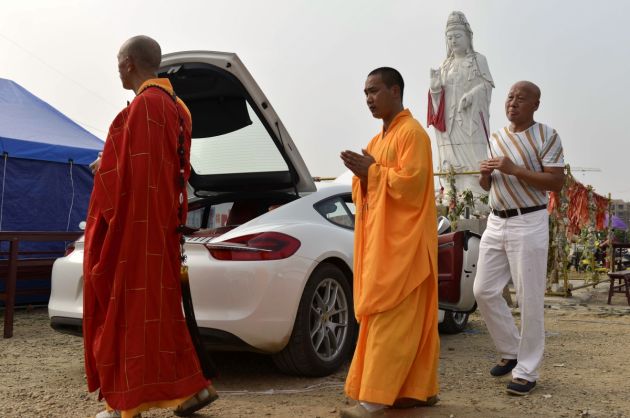Religion and spirituality low in East Asian societies, but ritual is stronger: Survey

East Asia can seem like one of the least religious regions in the world, with rates of disaffiliation high, a Pew survey has found, while many people across the region still hold religious or spiritual beliefs and engage in traditional rituals
The survey in Hong Kong, Japan, South Korea, Taiwan, and neighboring Vietnam finds many people don't identify with a religion but say they believe in unseen beings, venerate ancestors' spirits, and engage in ritual practices
Pew finds relatively few East Asian adults pray daily or say religion is very important in their lives, and overall, Christianity does not figure high in the region.
"And rates of disaffiliation – people leaving religion – are among the highest in the world," according to the new Pew Research Center survey of more than 10,000 adults in East Asia and neighboring Vietnam.
Still, the survey also finds that many people across the region continue to hold religious or spiritual beliefs and engage in traditional rituals.
Collecting data on religion in East Asia is a complex challenge, the researchers admitted.
The concept of religion was imported to the region by scholars only about a century ago, and common translations of "religion" (such as zongjiao in Chinese, shūkyō in Japanese and jonggyo in Korean) often are understood to refer to organized, hierarchical forms of religion, such as Christianity or new religious movements – not to traditional Asian forms of spirituality.
MAJORITY BELIEVE IN GOD OR UNSEEN THINGS
Of the adults surveyed in Hong Kong, Japan, South Korea, Taiwan and Vietnam, the majority say they believe in god or unseen beings.
Many also participate in ancestor veneration rituals with religious underpinnings.
For example, in Japan, 70 percent report that they have offered food, water or drinks to honor or care for their ancestors in the past 12 months.
In Vietnam, 86 percent have performed this ritual in the last year.
Praying or offering respect to religious figures or deities is fairly common. For example, 30 percent of adults in Hong Kong say they pray or offer their respects to Guanyin, a deity associated with compassion, and 46% in Taiwan pray or offer respects to Buddha.
Large numbers of adults across the East Asia region – varying from 27 percent n Taiwan to 61 percent in Hong Kong – say they have "no religion."
Yet even among these religiously unaffiliated people, half or more leave offerings for deceased ancestors; at least four in ten believe in god or unseen beings; and a quarter or more say that mountains, rivers, or trees have spirits.
"In short, when we measure religion in these societies by what people believe and do, rather than whether they say they have a religion, the region is more religiously vibrant than it might initially seem," the Pew report said
The departures were found mostly from Buddhism, Christianity and Daoism.
For instance, 15 percent of adults in Hong Kong say they were raised as Christians but now have no religion.
And 14 percent of South Korean and Japanese adults report that they were brought up as Buddhists but no longer identify with any religion.
However, the high rates of religious switching do not arise exclusively from people abandoning religion.
RAISED IN DIFFERENT TRADITION
Aboutt one-in-ten adults in South Korea (12 percent) and Hong Kong (9 percent) currently identify as Christian but were raised in a different religious tradition, such as Buddhism, or were raised with no religious identity.
East Asian rates of religious switching (from 32 percent in Japan to 53 percent in Hong Kong and South Korea) are higher than Pew Research Center has measured in many other places.
For example, in Pew cited previous survey of religion across Asai since 2019 - including in Cambodia, India, Indonesia, Malaysia, Singapore, Sri Lanka and Thailand.
That survery found that only Singapore's rate of religious switching (35 percent) approaches the rates seen in East Asian societies.
Hong Kong (37 percent) and South Korea (35 percent) have the world's highest shares of adults who say they were raised in a religion but who no longer identify with one.
They are followed by several Western European countries, including Norway (30 percent), the Netherlands (29 percent) and Belgium (28 percent).
